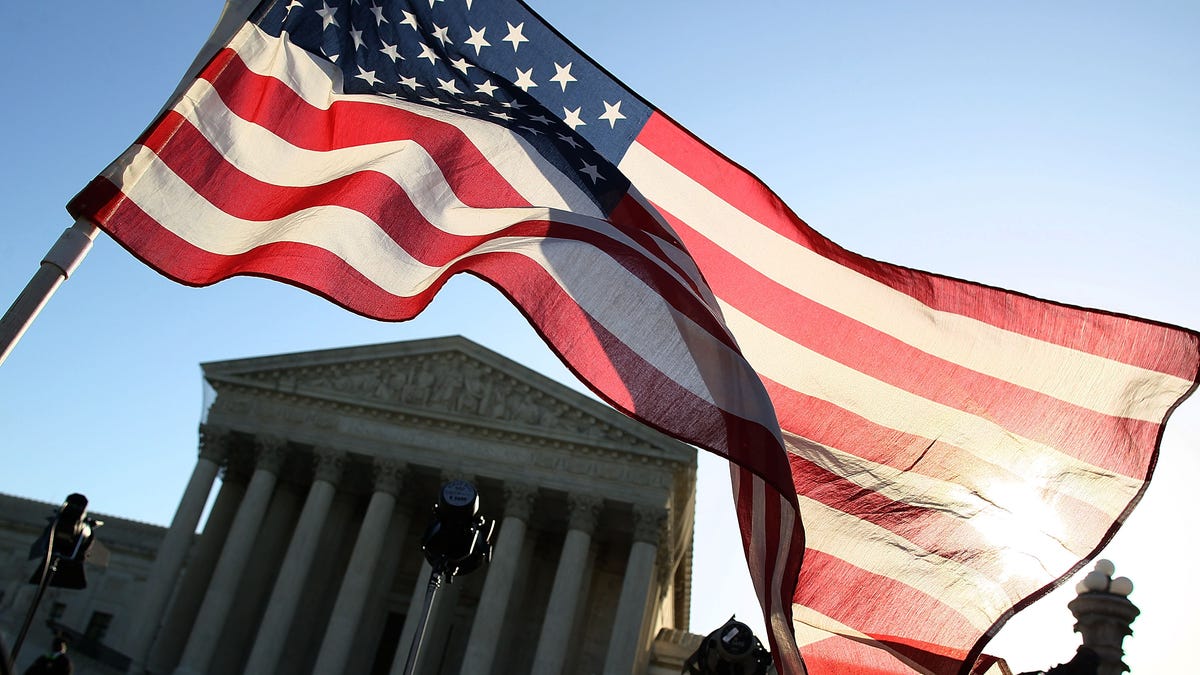
WASHINGTON, DC - MARCH 26: A person carries an American flag while marching in favor of the Patient Protection and Affordable Care Act in front of the U.S. Supreme Court on March 26, 2012 in Washington, DC. Today the high court, which has set aside six hours over three days, will hear arguments over the constitutionality President Barack Obama's Patient Protection and Affordable Care Act. (Photo by Mark Wilson/Getty Images) (2012 Getty Images)
Washington – Monday marked yet another Supreme Court showdown for Arizona and the Obama administration. At issue, this time, was the state's Proposition 200 measure, which requires voter registration applicants to provide documentation proving U.S. citizenship.
Critics of the measure say the state has no authority to go beyond what's required on the simplified federal voter registration form. On the federal form applicants must check a box indicating U.S. citizenship, sign attesting to that fact and drop the form in the mail.
Arizona officials, citing hundreds of cases of non-U.S. citizens registering to vote, say additional barriers need to be put in place.
Under Proposition 200, applicants can present a number of various documents, including driver’s license, birth certificate and certain Native American tribal documents.
"If somebody's willing to fraudulently vote, that person would be willing to sign falsely," said Arizona Attorney General Tom Horne, who argued the case Monday. "We need evidence that the person is a citizen," he added.
During the arguments, Justice Antonin Scalia expressed skepticism about the streamlined federal form. Referring to the required signature he said, "So it's under oath - big deal." Echoing Horne's reasoning, Scalia added, "If you're willing to violate the voting laws, I suppose you're willing to violate the perjury laws."
But despite any issues outlined by Arizona, many of the justices seemed to agree the state may have exceeded its authority on the issue of voter registration.
"The statute [says] each state must accept and use the federal form, period - that's the end," Justice Ruth Bader Ginsburg said.
Though the Justice Department was not an official party to the case, the Court permitted it to take part in Monday's arguments against Proposition 200. Retired Justice, and Arizona native, Sandra Day O'Connor sat in on arguments Monday. She often sits on lower federal courts that are understaffed, and was a part of the Ninth Circuit panel that struck down Proposition 200's heightened voter registration requirements.
O'Connor's former colleagues are expected to make a decision by June. In the meantime, opponents of the Arizona measure are feeling optimistic.
"Federal law overrides this provision," Nana Perales, Vice President of Litigation at the Mexican American Legal Defense and Educational Fund (MALDEF), said, adding, "We are confident today based on the arguments in the Supreme Court."
The Arizona case has broad implications because four other states — Alabama, Georgia, Kansas and Tennessee — have similar requirements, and 12 other states are contemplating similar legislation.
Opponents of Arizona's law see it as an attack on vulnerable voter groups such as minorities, immigrants and the elderly. They say Arizona's law makes registering more difficult, which is an opposite result from the intention of the 1993 National Voter Registration Act.
With additional reporting by The Associated Press.
Follow us on twitter.com/foxnewslatino
Like us at facebook.com/foxnewslatino




